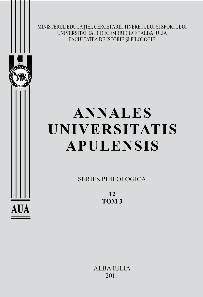Ilarie Chendi şi critica românească interbelică
Ilarie Chendi and the Romanian Interwar Critique
Author(s): Andrei TerianSubject(s): Literary Texts
Published by: Universitatea »1 Decembrie 1918« Alba Iulia
Keywords: Romanian literary journalism; rural/urban literature; Impressionism; subjectivity; critical creativity
Summary/Abstract: Abstract: This study approaches a re-evaluation of the activity carried out by the critic and cultural journalist Ilarie Chendi (1871-1913) from the perspective of his contributions to the development of the interwar Romanian literary criticism. The premise of our study is that, especially after the critic’s separation from the Sămănătorul (1905) journal and group, a mutation takes place in Chendi’s writing, materialized in a wider opening toward modernist literature, as well as an increased interest in the adoption of the new western critical theories. By keeping an eye on the influence exercised on Chendi by authors such as Anatole France or Adolf Bartels, our study considers the Romanian critic’s attitude toward issues such as Impressionism, subjectivity and the “creative” status of literary criticism. Our demonstration concludes that Ilarie Chendi is more than the founder of the Romanian critical feuilleton (in the institutional meaning of the notion); he is also a remarkable ideologist, who, through his articles, opens several of the paths to be travelled by the interwar Romanian criticism.
Journal: Annales Universitatis Apulensis. Series Philologica
- Issue Year: 12/2011
- Issue No: 1
- Page Range: 135-142
- Page Count: 8
- Language: Romanian

